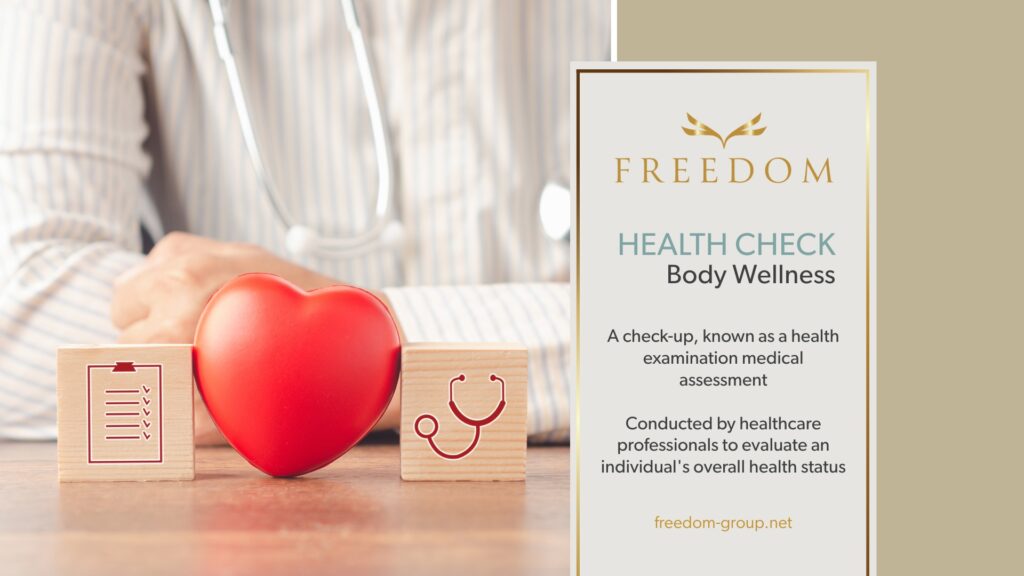
What is a body check-up?
A check-up, also known as a health examination or wellness check, is a comprehensive medical assessment conducted by healthcare professionals to evaluate an individual’s overall health status.
This proactive approach to healthcare involves a series of tests, screenings, and consultations aimed at detecting potential health issues before they become serious problems.
During a check-up, healthcare providers assess various aspects of physical health, such as blood pressure, cholesterol levels, and organ function. Additionally, they may inquire about lifestyle factors, medical history, and familial predispositions to tailor the examination to the individual’s unique health profile.
The primary goal of a check-up is to identify any potential health risks or early signs of diseases, allowing for timely intervention and preventive measures. Regular check-ups play a crucial role in maintaining good health, as they enable individuals to take proactive steps toward healthier lifestyles and informed healthcare decisions.
Why should I have a check-up?

Regular health check-ups are a cornerstone of preventive healthcare, offering a myriad of benefits that contribute to overall well-being. Engaging in routine check-ups provides individuals with valuable insights into their health status and empowers them to make informed decisions for a healthier lifestyle. Here are compelling reasons why you should prioritize having regular check-ups:
Early Detection of Health Issues:
One of the primary advantages of check-ups is the early detection of potential health problems. Many conditions, such as hypertension, diabetes, and certain cancers, may not display noticeable symptoms in their early stages.
Through regular screenings and tests during a check-up, healthcare professionals can identify these issues before they escalate, allowing for more effective and less invasive treatment.
Preventive Measures and Health Promotion:
Check-ups provide an opportunity for healthcare providers to offer personalized preventive guidance based on individual health risks and lifestyle factors.
This may include advice on nutrition, exercise, and other lifestyle modifications to reduce the risk of developing chronic conditions. Embracing preventive measures highlighted during a check-up can significantly contribute to long-term health.
Monitoring Health Trends Over Time:
Regular check-ups enable the tracking of health trends and changes over time. By establishing a baseline of your health parameters, healthcare professionals can monitor any deviations and intervene promptly if necessary.
This proactive approach is instrumental in preventing the progression of diseases and maintaining optimal health.
Peace of Mind and Reduced Health Anxiety:
Knowing that you are taking proactive steps to monitor and prioritize your health can provide peace of mind. Regular check-ups help alleviate health-related anxiety, as individuals become more aware of their health status and can confidently address any concerns with their healthcare providers.
Cost-Effective Healthcare:
Investing in preventive healthcare through regular check-ups is a cost-effective strategy in the long run. Early detection and management of health issues can prevent more extensive and expensive treatments later on.
By prioritizing preventive care, individuals can potentially reduce overall healthcare costs and enhance their quality of life.
Read more about Freedom Health Care and book your Body Check Up today!
What kind of tests are included in the check up?

A comprehensive check-up typically involves a battery of tests and screenings designed to assess various aspects of an individual’s health. These tests are tailored to provide a thorough evaluation, considering factors such as age, gender, medical history, and lifestyle. Below are some common tests included in a standard check-up:
Blood Pressure Measurement:
Regular monitoring of blood pressure is crucial for assessing cardiovascular health. Elevated blood pressure can be an early indicator of potential heart-related issues.
Cholesterol Levels Assessment:
Checking cholesterol levels helps evaluate the risk of heart disease. Elevated cholesterol, particularly LDL (low-density lipoprotein), is associated with an increased risk of cardiovascular problems.
Blood Glucose Testing:
Screening for blood glucose levels is essential for detecting diabetes or prediabetic conditions. Early identification allows for effective management and lifestyle modifications.
Complete Blood Count (CBC):
This test assesses the quantity and quality of blood cells, providing insights into overall health. Abnormalities may indicate infections, anemia, or other blood-related disorders.
Body Mass Index (BMI) Measurement:
BMI is a simple calculation based on height and weight, serving as an indicator of whether an individual is underweight, normal weight, overweight, or obese.
Vision and Hearing Tests:
Basic assessments of vision and hearing are often included to identify any impairments that may require further attention.
Cancer Screenings:
Depending on age, gender, and risk factors, check-ups may include screenings for common cancers such as breast, cervical, prostate, or colorectal cancer.
Thyroid Function Tests:
Evaluating thyroid function helps identify conditions like hypothyroidism or hyperthyroidism, which can affect metabolism and energy levels
Liver and Kidney Function Tests:
Assessing liver and kidney function through blood tests provides information about the body’s detoxification and filtration processes.
Bone Density Measurement:
Bone density testing, especially for postmenopausal women and older adults, helps assess the risk of osteoporosis and fractures.
Read more about Freedom Health Care and book your Body Check Up today!
Who is Recommended to Undergo a Check-up?
Health check-ups are beneficial for individuals of all ages and backgrounds, contributing to the maintenance of overall well-being and the prevention of potential health issues.
While the frequency and specific tests may vary based on factors such as age, gender, and individual health history, the general recommendation is that everyone should undergo regular check-ups. Here are some guidelines to help determine who is recommended to undergo a check-up:
Adults of All Ages: Adults, regardless of age, can benefit from regular health check-ups. These examinations serve as proactive measures to monitor health, identify risk factors, and detect potential issues early on.
Seniors: As individuals age, the risk of certain health conditions increases. Seniors, typically aged 65 and older, are often encouraged to have more frequent and comprehensive check-ups to address age-related health concerns.
Children and Adolescents: Regular pediatric check-ups are crucial for monitoring growth and development, addressing vaccinations, and identifying any early signs of health or behavioral issues.
Individuals with Chronic Conditions: Those with chronic conditions, such as diabetes, hypertension, or heart disease, should undergo regular check-ups to manage their conditions effectively and prevent complications.
Individuals with Family History of Diseases: Individuals with a family history of certain diseases, such as cancer or cardiovascular conditions, may be recommended to have more frequent and targeted check-ups to assess their risk factors.
Men and Women Planning Parenthood: Couples planning to conceive are often advised to undergo preconception health check-ups to ensure optimal health before pregnancy. Prenatal check-ups for expectant mothers are also crucial for monitoring the health of both the mother and the developing baby.
Individuals with Risky Lifestyles: Those engaging in risky behaviors, such as smoking, excessive alcohol consumption, or a sedentary lifestyle, may benefit from more frequent check-ups to monitor and address associated health risks.
Occupational Health Checks: Certain professions may expose individuals to specific health risks. Occupational health check-ups help ensure that individuals working in such environments are monitored for any potential health issues related to their work.
Evaluation of Different Sections in the Check-up Process
A comprehensive health check-up involves the assessment of various sections, each targeting specific aspects of an individual’s well-being. This process provides a holistic understanding of health, aiding healthcare professionals in offering personalized recommendations. The key sections of a check-up include:
Medical History Assessment: The check-up starts with a thorough review of the individual’s medical history, encompassing past illnesses, surgeries, medications, and chronic conditions. This information guides the check-up process and tailors it to specific health concerns.
Vital Signs Measurement: Basic physiological functions, such as blood pressure, heart rate, respiratory rate, and body temperature, are measured to assess overall health.
Physical Examination: A hands-on examination by a healthcare professional assesses various bodily systems, including the eyes, ears, nose, throat, heart, lungs, abdomen, skin, and neurological functions. This helps identify potential abnormalities or signs of disease.
Read more about Freedom Health Care and book your Body Check Up today!



